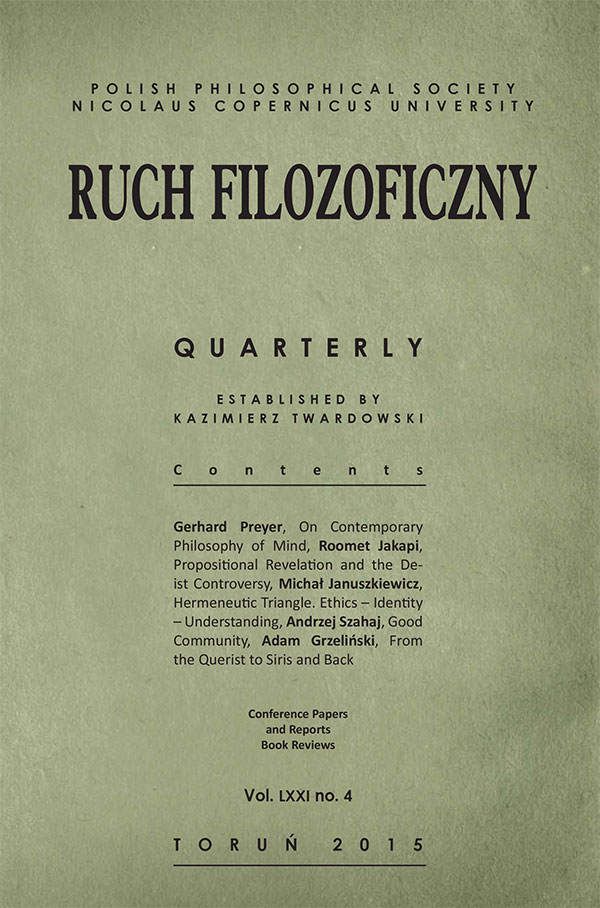“Is There a Problem about Fictional Discourse”? J. Searle vs. R. Rorty
DOI:
https://doi.org/10.12775/RF.2015.004Słowa kluczowe
fiction, pretended illocutions, language games, description so far/from now on, interpretive community, institution, essentialist text-centered theory, pragmatic conception, theories vs. telling storiesAbstrakt
John Searle’s and R. Rorty’s deliberations represent two different view on a problem of fictional discourse. Searle still locates the meaning of fiction primarily in the objective text, not in an extra-fictional order as his initial pragmatic perspective of research could suggest. Therefore, his conception is still representative of the text-centred, essentialist thinking in a reflection on fiction. R. Rorty formulates the thesis that Searle did not solve the problem of relating words to the world and did not present a coherent theory of fictional discourse. According to Rorty’s deliberations, the discourse about fiction should transform itself into criticism and this way, it may become the literary practice. Removing the notion of fiction as an essentialist feature of a text from ontologically and linguistically orientated research is characteristic of contemporary thinking about fiction. This cultural, pragmatic and ethical turn is aimed at the new type of discourse in which researching on semantics of the text is replaced by the research on the model of the world and its descriptions functioning in each interpretative community. In the present paper I try to answer some important questions founded on the comparison of these two different conceptions, for example: is the discourse about fictionality (philosophically or literary orientated) useful and sensible and what kind of functions does it fulfill. I claim, following Josef Mitterer’s non-dualiznig philosophy and Rorty’s considerations, that as long as there will be the institutions interested in such a discourse, there will be reasons to construct them and there is no need to be afraid of losing the sensibility of our work.
Bibliografia
Austin J. (1986), How To Do Things With Words: the William James lectures delivered at Harvard University in 1955 / J. L. Austin; ed. by J. O. Urmson and M. Sbisa, Oxford.
Cyzman M., Beyond Objectiveness: Non-dualism and Fiction, “Constructivist Foundations” 8/2 (2013). The special issue: Non-dualism: A Conceptual Revision, Editors: Alexander Riegler & Stefan Weber, p. 174–175.
Cyzman M., The Logical Status of Fictional Discourse’ by John Searle – a still possible solution to an old problem?, “Logic and Logical Philosophy” 2011, t. 20, nr 4, s. 317–326.
Fish S., What Makes an Interpretation Acceptable? in: Is There a Text in This Class? The Authority of Interpretive Communities, Harvard University Press, Cambridge, Massachusetts, London, England 1980, p. 338–355.
Glasersfeld E. von, An introduction to radical constructivism, w: The Invented Reality: How Do We Know What We Believe We Know? (Contributions to Constructivism), ed. P. Watzlawick, W. W. Norton and Co, Norton, New York, s. 17–40.
Goodman N., Ways of worldmaking, Hackett Publishing Company, Indianapolis 1978.
Łebkowska A., Między teoriami a fikcją literacką, Universitas, Kraków 2001, p. 112–113.
Mitterer J., On Interpretation, “Constructivist Foundations” 8/2 (2013). The special issue: Non-dualism: A Conceptual Revision, Editors: Alexander Riegler & Stefan Weber, p. 143–147.
Mitterer J., Tamta strona filozofii. Przeciwko dualistycznej zasadzie poznania, trans. M. Łukasiewicz, Oficyna Naukowa, Warszawa 1996. Originally published as: J. Mitterer, Das Jenseits der Philosophie. Wider das dualistische Erkenntnisprinzip, Passagen, Vienna 1992.
Ohmann R. (1971), Speech Acts and the Definition of Literature, “Philosophy and Rhetoric” 4, nr 1, s. 1–19.
Ohmann R. (1973), Literature as Act, in: Approaches to Poetics, ed. S. Chatman, New York–London, s. 81–107.
Rorty R., Text and Lumps, in: R. Rorty, Objectivity, Relativism, and Truth. Philosophical Papers. Vol. 1, Cambridge University Press, 1995, p. 78–92.
Rorty R., Is There a Problem about Fictional Discourse? in: Consequences of Pragmatism (Essays: 1972-1980), University of Minnesota Press, Minneapolis 1994, p. 110–138.
Schmidt S., Fictionality in literary and non-literary discourse, “Poetics” 9 (5–6), p. 525–546.
Searle J. R. (1975), The Logical Status of Fictional Discourse, „New Literary History” 6, p. 319–332.
Tomasik W. (1990), Od „etiolacji” do „ideologii szczerości”. Teoria aktów mowy a literatura, „Pamiętnik Literacki” z. 3, s. 115–144.
Pobrania
Opublikowane
Jak cytować
Numer
Dział
Statystyki
Liczba wyświetleń i pobrań: 947
Liczba cytowań: 0



